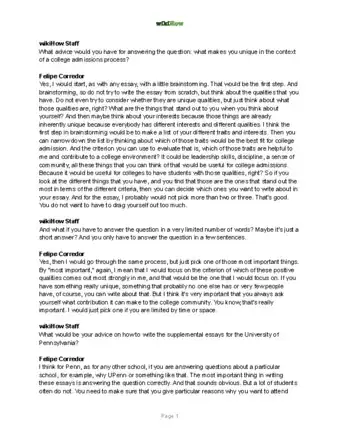This article was co-authored by Felipe Corredor. Felipe is a Senior College Admissions Consultant at American College Counselors with over seven years of experience. He specializes in helping clients from all around the world gain admission into America's top universities through private, one-on-one consulting. He helps guide clients through the entire college admissions process and perfect every aspect of their college applications. Felipe earned a Bachelor's Degree from the University of Chicago and recently received his MBA.
There are 21 references cited in this article, which can be found at the bottom of the page.
This article has been viewed 72,864 times.
A PhD in accounting is an ideal academic path if you intend to teach at a university or conduct serious research. Getting into a PhD program in this field requires a minimum of a bachelor's degree, although some programs prefer applicants with a graduate degree. Finishing a doctorate in accounting usually takes four to five years, and involves taking the required courses, writing a dissertation and, passing a comprehensive exam.
Steps
Completing Requirements for a PhD Program in Accounting
-
1Take all necessary academic prerequisites.[1] Some PhD programs in accounting require a bachelor's degree in accounting, business, economics or finance. Other programs allow you to obtain an undergraduate degree in any subject as long as you satisfy prerequisite courses, which typically include a fundamental accounting course, calculus, linear algebra, statistics and probability.
- Check the prerequisite list of the specific program you’re interested in applying to. If you are unsure, contact the university department directly with your questions. This can help you see if the classes you took at one school will transfer to another university.
- Common perquisites include linear algebra, multivariate calculus, and an understanding of integration and differentiation. An MBA-level statistics course is a good class to take as well.
-
2Complete a graduate degree. To prepare yourself for a PhD in accounting, you’ll need at least two years of graduate-level econometrics, statistics, and mathematics.[2] The best way to get an understanding of these topics is through a master's degree program. While not every PhD program will require a master's degree, getting a master’s before embarking on your PhD program is the best way to prepare.
- Earning a master’s will also make your university application much stronger.
- In addition to earning a master’s, some programs prefer applicants to have worked or conducted research in the accounting field prior to applying. For instance, a job as a CPA or independent auditor could strengthen your understanding of the field.
Advertisement -
3Take the appropriate tests. Graduate students in accounting will need to take the Graduate Record Examination (GRE) or Graduate Management Admission Test (GMAT). Some programs prefer the GMAT, whereas others accept only the GRE. Other schools will take either.[3] Check with the program you're applying to in order to find out which test you should take. Apply to the schools you're interested in as soon as possible after taking these tests; in most cases, your test scores cannot be accepted if they are more than five years old.
- The GRE is a general proficiency test covering verbal reasoning, quantitative reasoning, and analytical writing.[4] The test lasts about four hours, including short breaks allowed between the test sections. There are a variety of test prep materials available for free at https://www.ets.org/gre/revised_general/prepare/. You can take either a paper-based or computer-based test, and sign up for either online at https://www.ets.org/gre/revised_general/register/centers_dates/.
- The GMAT is a general proficiency test covering analytical writing, integrated reasoning, quantitative problem solving, and verbal comprehension. The exam lasts 3.5 hours.[5] There are a variety of test prep materials available online at http://www.mba.com/us/the-gmat-exam/prepare-for-the-gmat-exam.aspx. You could also check out your local library or bookstore for GMAT handbooks and sample tests. To sign up to take the GMAT, visit https://accounts.gmac.com/Account/Register.
Applying to a PhD Program
-
1Pen your personal statement. Explain why you’re interested in a PhD in accounting. Do you want to work for a major financial policy institute? Teach at the university level? Expand your professional opportunities? The personal statement is a good opportunity to clarify your own thinking about why you want to get a PhD in the first place.[6]
- Decide what type of research you want to do -- archival, experimental or behavioral, or analytical -- and commit to it in your personal statement before applying to a school.[7] To get a better idea of what type of research is available, read some current academic literature and meet with the professors at the school(s) you’re thinking of applying to.
- Later, you can incorporate a modified version of your personal statement along with your university application. Add information about why or how the particular PhD program you’ve applied to will help you meet the goals you expressed in your personal statement. Follow the doctoral program's guidelines for word length and content.
-
2Select a program specialty. Some accounting PhD programs offer a focus on finance, marketing, organizational management, real estate or operational management.[8] Other specialties include public policy, business policy, or pure accounting. Read academic papers in each sub-field in order to determine what topic speaks to you.
-
3Look at various programs and choose one that will help you meet your goals.[9] Using the generalized personal statement you wrote before, compare the programs at each university you’re considering. For instance, if your personal statement is to get a job as a professor, you should choose the school that produces the most accounting professors.
- Whatever school you choose, ensure its program offers the necessary coursework and will provide you with the experience you want to help you meet your future goals.
- You should also look at requirements for obtaining a PhD at the various schools. Do they expect students to graduate in three years? Two years? What classes and skills does the program emphasize?
-
4Talk to professors in the accounting program at the universities you’re applying to. Get a feel for whether you might want any of them as your academic advisor.[10] Additionally, read the academic publications of the accounting faculty at the various schools you’re considering to see if their work excites and challenges you.[11] If not, you might want to look at other programs.
-
5Solicit and submit letters of recommendation. Part of your application will require professors and/or work supervisors to recommend your abilities and competence. If possible, request these letters while still in school and on the job so that your qualities and performance are fresh in their minds. If you request them after graduation, be sure to include a sample of your work -- a well-done project or essay -- along with a polite email or letter asking for a letter of recommendation.
- Explain why you need the letter, and why you’re asking for the particular professor’s advice. For instance, you might explain to a favored professor that he or she inspired you to continue developing your understanding of accounting, and you’re now following up on their advice by pursuing a PhD.
-
6Submit your applications. Most programs require an application to both the accounting program as well as the graduate school.[12] One or both applications will require information about your academic background, work history, and GRE or GMAT scores.[13] . After double-checking all your required documents for spelling errors and omissions, submit them to the appropriate university department.
Being a Good Student
-
1Arrive early at the school. Many PhD students are expected to be in the office or on campus from 8:00-5:00 during the week. This will earn you the respect of the faculty.[14] Making a good impression with the faculty, especially as a first-year student, is very important and could open more opportunities for you later.
- Additionally, stay late once in a while. Stick around to talk to students you’re teaching, or put in some extra time on your dissertation.
- Show up on at least one day during the weekends, too. Vary the time you go to campus on weekends so that you see many different professors (and many different professors see you).
-
2Dress professionally. Keep your wardrobe business casual when on campus, at least during weekdays.[15] This will create the impression that you’re a serious person. Don’t wear cargo shorts, brightly colored clothing, or torn/ripped jeans. Choose neutral earth tones. Men should wear khakis, dress shirts, or short-sleeved polo shirts. Women should wear skirts or slacks. Avoid open-toed shoes and T-shirts.
-
3Don’t try to read everything.[16] PhD students are assigned a dizzying amount of reading, often 300-500 pages of reading per week. Try to understand the main points the author is making, and draw out enough information so that you can talk about it during your seminars with a reasonable degree of proficiency.
-
4Present at conferences. Academic conferences, colloquia, and consortiums are great opportunities for presenting your original research and networking with others in your field who can inspire you to investigate new avenues for research.[17] Your university will distribute calls for papers (CFPs) to you and all graduate students in your department. Check them regularly to see if there’s a conference or other meeting where you feel you could contribute something.
- Presentation experience looks great on a resume.
- Even if you can’t present at a conference, you should attend as many as you can to keep up with current research and meet your fellow accounting colleagues.
Completing the PhD Program in Accounting
-
1Enroll in and complete the required courses. Depending on the program and your area of specialty, courses might include economics, business, finance, accounting principles, research methods in social science, microeconomic theory, qualitative methods, data mining, managerial accounting, auditing and a doctoral seminar.
- Most PhD programs require two years of coursework, though some require three years.[18]
-
2Meet exam requirements. Most doctoral programs require that you successfully pass at least one comprehensive exam (or comp) that covers the content you learned throughout the course of your academic career in accounting. There are both written and oral comps, and you might need to take one of each. In many cases, the PhD program will provide you with study guidelines for the exam and will tailor the comp questions to your specific area of specialty.
- To prepare for the comps, write a brief (one page) summary of each academic article you read during your seminars and classes. Summarize the main argument or question the author is tackling, as well as his or her findings and conclusion.
-
3Develop your dissertation topic. When getting your PhD, you’ll need to write a dissertation, a long, book-like treatise on a particular problem or issue in modern accounting. Your dissertation should be focused, specific, and thorough. Your academic advisor -- a member of the university’s accounting faculty -- will help you focus the dissertation question or questions, and point you in the direction of useful research.
- You may have suggested the topic you want to work on in your initial application to the university. Don’t feel obligated to stick to that exact topic, since other issues or problems in accounting might spark your interest as you progress in your program. However, ensure that whatever topic you select is one that you’ll be able to receive guidance on from your academic advisor.
- Current trends in accounting encourage PhD students to pursue positivist (non-theoretical) research on subjects relating to the influence of accounting practices on global markets.[19]
-
4Craft a research plan. After you’ve settled on a research topic, you’ll need to make an actual research plan. This means identifying sources you want to examine, traveling to archives (if necessary), and creating a timetable in which you’ll meet certain benchmarks for writing the dissertation.[20] You may need to pursue outside funding from your institution or the institution you will be conducting research at.
- You might begin by drafting an outline of your dissertation on the topic of tax evasion. Perhaps you’ll break the dissertation down into various subtopics or chapters, each focused on a particular issue or question related to tax evasion such as the ethics of tax evasion, the law regarding tax evasion, and the future directions accountants that investigate tax evasion could pursue.
- Decide when you want each chapter completed and give yourself a certain number of hours each week to work on the dissertation.
- If you're conducting research at a far-away archive, ask the archive or its parent institution if they offer funding for visiting scholars. Alternately, contact the head of your own school's accounting department about getting travel funds.
-
5Conduct your research. With your research questions and your timetable laid out for you, you’ll be able to look for sources to develop your dissertation. You should take advantage of both academic literature and raw data if you’re interested in financial accounting and taxation. You should use an experimental approach if you’re conducting research related to auditing or financial decision-making.[21]
- Use academic literature databases like Corporate Information (http://www.corporateinformation.com/), EconLit (https://www.aeaweb.org/econlit/), and Research Papers in Economics (http://repec.org/) to look for useful academic resources.
- Examine raw data relevant to your topic. There are man sources of raw data that you can use to develop your dissertation, including stock prices, financial statements, and mathematical proofs.[22]
- Think about the sources that would be most useful to you and ask your academic advisor for advice as to where you might look for more information.
- If you’re interested in experimental research, you will need to arrange controlled experiments with people to probe questions related to accounting. For instance, perhaps you want to find out how much people know about different types of investments. You could conduct oral interviews or administer surveys asking specific questions about the differences between IRAs, Roth IRAs, stocks, and mutual funds.
-
6Take rigorous notes. When you identify useful sources, immediately write them down in a notebook or a word processor file. Alternately, you could note them directly in your working dissertation document, then develop them later when you have time look at the source and footnotes in more detail.[23] If you’re conducting experimental research, use surveys and record interviews whenever possible. Either way, ensure you document the sources you use and keep a paper trail for yourself to consult when you go back to summarize your findings.
- Ensure you obtain permission before recording potential interview subjects.
-
7Write your dissertation. Crafting the dissertation is a research-intensive process.[24] The dissertation should explore the findings of your research or experimentation in depth, and demonstrate that you have a deep and thorough understanding of accounting.[25]
- The front portion of the dissertation should be used to ground your research process by demonstrating how your research relates to the other academic publications in the field. For instance, if you write about managerial accounting, you should read as much as possible in the academic literature about managerial accounting, including past PhD theses. Use prior studies to give meaning to your own work by demonstrating that your dissertation is exploring new territory.[26]
- You should end the introduction with a specific statement outlining your argument, and a summary of each chapter or section of your dissertation.
- The body of the dissertation lays out your main findings. Each chapter should look at a specific topic relating to the larger issue you're examining. For instance, if you write about managerial accounting, you might use each chapter to examine accounting practices in several different large firms within a single industry. The chapters would offer in-depth information comparing and contrasting the different accounting practices with each other.
- Conclude your dissertation with a final section summarizing your findings overall and suggesting new directions or solutions to the topic you've examined. Include raw data -- stock prices, interview transcripts or surveys, and other documents -- in an appendix.
- During your writing process, submit chapters or portions of the dissertation to your academic advisor for review. Use his or her feedback to shape your dissertation.
- After completing the dissertation, you must present your dissertation before a departmental committee. The committee will ask you probing questions about your research process and findings. Talk to your academic advisor about how you can best prepare for the questions you might be confronted with.
Expert Q&A
-
QuestionHow do you write a research proposal for a PhD?
 Felipe CorredorFelipe is a Senior College Admissions Consultant at American College Counselors with over seven years of experience. He specializes in helping clients from all around the world gain admission into America's top universities through private, one-on-one consulting. He helps guide clients through the entire college admissions process and perfect every aspect of their college applications. Felipe earned a Bachelor's Degree from the University of Chicago and recently received his MBA.
Felipe CorredorFelipe is a Senior College Admissions Consultant at American College Counselors with over seven years of experience. He specializes in helping clients from all around the world gain admission into America's top universities through private, one-on-one consulting. He helps guide clients through the entire college admissions process and perfect every aspect of their college applications. Felipe earned a Bachelor's Degree from the University of Chicago and recently received his MBA.
College Admissions Consultant Take time to brainstorm so you're really clear on what you're doing. Is your idea something that's going to provide new and useful knowledge to your field of study? Is it something that's never been done before? Make sure that you're interested in the topic as well, or else you won't have the energy to write a proposal (let alone conduct the research). As you start your draft, go in depth about the different facets of your proposal. What's going to be your methodology? Why is this important? Why is it new? Give a practical idea of how you would go about finding all these different things out; hopefully, you'll cite other research along the way.
Take time to brainstorm so you're really clear on what you're doing. Is your idea something that's going to provide new and useful knowledge to your field of study? Is it something that's never been done before? Make sure that you're interested in the topic as well, or else you won't have the energy to write a proposal (let alone conduct the research). As you start your draft, go in depth about the different facets of your proposal. What's going to be your methodology? Why is this important? Why is it new? Give a practical idea of how you would go about finding all these different things out; hopefully, you'll cite other research along the way. -
QuestionHow do I choose a dissertation topic?
 Community AnswerA dissertation topic should be chosen carefully after consulting your advisor. Read current and classical academic literature to get a sense of problems in the field. What subjects are missing, or need a more modern analysis? What questions are unasked?
Community AnswerA dissertation topic should be chosen carefully after consulting your advisor. Read current and classical academic literature to get a sense of problems in the field. What subjects are missing, or need a more modern analysis? What questions are unasked?
Expert Interview

Thanks for reading our article! If you'd like to learn more about earning a PhD, check out our in-depth interview with Felipe Corredor.
References
- ↑ http://goingconcern.com/post/what-you-need-know-about-getting-accounting-phd-program
- ↑ http://goingconcern.com/post/whats-getting-phd-accounting-really-all-about
- ↑ http://www.kellogg.northwestern.edu/departments/accounting/programs/phd_program/apply.aspx
- ↑ https://www.ets.org/gre/revised_general/about/content/
- ↑ http://www.mba.com/us/the-gmat-exam/gmat-exam-format-timing.aspx
- ↑ http://www.journalofaccountancy.com/news/2009/mar/pursuingaphdinaccounting.html
- ↑ http://goingconcern.com/post/what-you-need-know-about-getting-accounting-phd-program
- ↑ http://www.haas.berkeley.edu/Phd/academics/index.html
- ↑ http://www.journalofaccountancy.com/news/2009/mar/pursuingaphdinaccounting.html
- ↑ http://www.journalofaccountancy.com/news/2009/mar/pursuingaphdinaccounting.html
- ↑ http://goingconcern.com/post/what-you-need-know-about-getting-accounting-phd-program
- ↑ http://goingconcern.com/post/what-you-need-know-about-getting-accounting-phd-program
- ↑ http://www.kellogg.northwestern.edu/departments/accounting/programs/phd_program/apply.aspx
- ↑ http://goingconcern.com/post/five-tips-first-year-accounting-phd-candidates
- ↑ http://goingconcern.com/post/five-tips-first-year-accounting-phd-candidates
- ↑ http://goingconcern.com/post/five-tips-first-year-accounting-phd-candidates/
- ↑ http://goingconcern.com/post/five-tips-first-year-accounting-phd-candidates
- ↑ http://www.journalofaccountancy.com/news/2009/mar/pursuingaphdinaccounting.html
- ↑ http://goingconcern.com/post/whats-getting-phd-accounting-really-all-about
- ↑ https://books.google.com/books?id=0NZLQlBEpnAC&lpg=PA14&pg=PA13#v=onepage&q&f=false
- ↑ http://www.terry.uga.edu/phd/concentrations/accounting
- ↑ https://gpae.wcu.edu/Vol6/Reading_and_Understanding_Academic_Research.pdf
- ↑ https://books.google.com/books?id=0NZLQlBEpnAC&lpg=PA14&pg=PA14#v=onepage&q&f=false
- ↑ http://goingconcern.com/post/whats-getting-phd-accounting-really-all-about
- ↑ http://www.chappellseminars.com/basic-rules-of-composing-an-accounting-dissertation-topic.htm
- ↑ https://gpae.wcu.edu/Vol6/Reading_and_Understanding_Academic_Research.pdf












































































